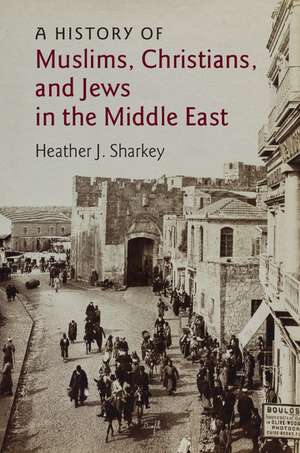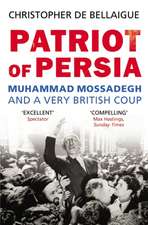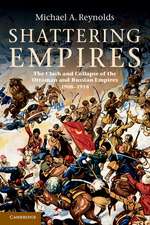A History of Muslims, Christians, and Jews in the Middle East: The Contemporary Middle East, cartea 6
Autor Heather J. Sharkeyen Limba Engleză Paperback – 2 apr 2017
| Toate formatele și edițiile | Preț | Express |
|---|---|---|
| Paperback (1) | 203.67 lei 3-5 săpt. | |
| Cambridge University Press – 2 apr 2017 | 203.67 lei 3-5 săpt. | |
| Hardback (1) | 559.98 lei 6-8 săpt. | |
| Cambridge University Press – 2 apr 2017 | 559.98 lei 6-8 săpt. |
Din seria The Contemporary Middle East
-
 Preț: 287.71 lei
Preț: 287.71 lei -
 Preț: 290.15 lei
Preț: 290.15 lei -
 Preț: 280.04 lei
Preț: 280.04 lei -
 Preț: 301.55 lei
Preț: 301.55 lei -
 Preț: 200.13 lei
Preț: 200.13 lei -
 Preț: 213.16 lei
Preț: 213.16 lei -
 Preț: 482.53 lei
Preț: 482.53 lei - 15%
 Preț: 439.20 lei
Preț: 439.20 lei - 13%
 Preț: 297.99 lei
Preț: 297.99 lei -
 Preț: 431.35 lei
Preț: 431.35 lei -
 Preț: 408.88 lei
Preț: 408.88 lei -
 Preț: 463.28 lei
Preț: 463.28 lei -
 Preț: 485.40 lei
Preț: 485.40 lei - 15%
 Preț: 460.25 lei
Preț: 460.25 lei -
 Preț: 442.71 lei
Preț: 442.71 lei -
 Preț: 409.51 lei
Preț: 409.51 lei -
 Preț: 358.19 lei
Preț: 358.19 lei -
 Preț: 349.91 lei
Preț: 349.91 lei -
 Preț: 488.71 lei
Preț: 488.71 lei -
 Preț: 290.54 lei
Preț: 290.54 lei -
 Preț: 201.59 lei
Preț: 201.59 lei -
 Preț: 274.88 lei
Preț: 274.88 lei -
 Preț: 200.13 lei
Preț: 200.13 lei
Preț: 203.67 lei
Nou
Puncte Express: 306
Preț estimativ în valută:
38.98€ • 42.32$ • 32.74£
38.98€ • 42.32$ • 32.74£
Carte disponibilă
Livrare economică 01-15 aprilie
Preluare comenzi: 021 569.72.76
Specificații
ISBN-13: 9780521186872
ISBN-10: 0521186870
Pagini: 394
Ilustrații: 18 b/w illus.
Dimensiuni: 152 x 228 x 22 mm
Greutate: 0.55 kg
Editura: Cambridge University Press
Colecția Cambridge University Press
Seria The Contemporary Middle East
Locul publicării:New York, United States
ISBN-10: 0521186870
Pagini: 394
Ilustrații: 18 b/w illus.
Dimensiuni: 152 x 228 x 22 mm
Greutate: 0.55 kg
Editura: Cambridge University Press
Colecția Cambridge University Press
Seria The Contemporary Middle East
Locul publicării:New York, United States
Cuprins
1. Muslims, Christians, and Jews in the Middle East; 2. The Islamic foundations of inter-communal relations; 3. The Ottoman experience; 4. The Ottoman Empire in an age of reform: from Sultan Mahmud II to the end of the Tanzimat era, 1808–76; 5. The pivotal era of Abdulhamid II, 1876–1909; 6. Coming together, moving apart: Ottoman Muslims, Christians, and Jews at the turn of the century; Epilogue.
Recenzii
'A captivating profile of the religious diversity in the Middle East that has been driven to the brink of extinction in the century since the fall of the Ottoman Empire. A brilliant and essential history for understanding the tragedy of intolerance in the Arab world today.' Eugene Rogan, University of Oxford
'In this book, Heather J. Sharkey is not afraid to tackle major historical questions that are still relevant today: religion as an explanatory factor in history, the question of violence and religious liberty in Islam, the possibility of shared public spaces and secular culture. The originality of her work comes from her attention to the sensory experiences of historical actors and of the reader, in using images, clothes, foods and sounds as historical sources. Thus she invites us to reconsider the relationship between Muslims, Jews and Christians, on the basis of their everyday life.' Bernard Heyberger, École des Hautes Études en Sciences Sociales, Paris
'Heather J. Sharkey provides a remarkable study of Muslim-Christian-Jewish relations in history that does not ignore the conflicts but also presents in-depth insights into day-to-day intercommunal relations. Her discussion of interreligious relations at the level of ordinary 'mundane' life adds a vital dimension to our understanding this subject. Sharkey's study makes a significant contribution generally to scholarship on pluralism and diversity in world history as well as specifically contributing to the understanding of cultural-religious-political history of the Middle East.' John Voll, Georgetown University, Washington, DC
'Heather Sharkey's nuanced, complex, and unique book stands out because of her focus on a much larger geographical area (the Ottoman Empire, with occasional references to Iran and Morocco), as well as a longer historical timeframe (the 7th through early 20th centuries, with a focus on the Ottoman period). Moreover, she clearly weaves together three distinct analytical approaches: the theological, the political, and the social. By examining each of these elements of Ottoman society, Sharkey illuminates both Ottoman policies and the practices of Ottoman subjects. These features mark this text as an important standard for decades to come.' Noah Haiduc-Dale, Journal of Church and State
'In this book, Heather J. Sharkey is not afraid to tackle major historical questions that are still relevant today: religion as an explanatory factor in history, the question of violence and religious liberty in Islam, the possibility of shared public spaces and secular culture. The originality of her work comes from her attention to the sensory experiences of historical actors and of the reader, in using images, clothes, foods and sounds as historical sources. Thus she invites us to reconsider the relationship between Muslims, Jews and Christians, on the basis of their everyday life.' Bernard Heyberger, École des Hautes Études en Sciences Sociales, Paris
'Heather J. Sharkey provides a remarkable study of Muslim-Christian-Jewish relations in history that does not ignore the conflicts but also presents in-depth insights into day-to-day intercommunal relations. Her discussion of interreligious relations at the level of ordinary 'mundane' life adds a vital dimension to our understanding this subject. Sharkey's study makes a significant contribution generally to scholarship on pluralism and diversity in world history as well as specifically contributing to the understanding of cultural-religious-political history of the Middle East.' John Voll, Georgetown University, Washington, DC
'Heather Sharkey's nuanced, complex, and unique book stands out because of her focus on a much larger geographical area (the Ottoman Empire, with occasional references to Iran and Morocco), as well as a longer historical timeframe (the 7th through early 20th centuries, with a focus on the Ottoman period). Moreover, she clearly weaves together three distinct analytical approaches: the theological, the political, and the social. By examining each of these elements of Ottoman society, Sharkey illuminates both Ottoman policies and the practices of Ottoman subjects. These features mark this text as an important standard for decades to come.' Noah Haiduc-Dale, Journal of Church and State
Notă biografică
Descriere
This book traces the history of conflict and contact between Muslims, Christians, and Jews in the Ottoman Middle East prior to 1914.














